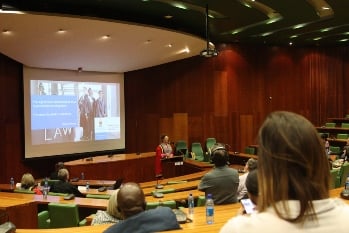The event began with a warm welcome from Professor Elsabe Schoeman, Dean of UP Faculty of Law, expressing delight at everyone's presence for this significant occasion. She extended her greetings to various dignitaries, including Deputy Vice-Chancellor(DVC): academic Professor Loretta Feris, Deputy Dean Professor Charles Maimela, and Head of Department of Mercantile Law Professor Phumudzo Munyai. Professor Schoeman also acknowledged Professor Renke's family and friends, emphasising the importance of the night for the guest of honour, Professor Stéfan Renke. She then handed the floor to Professor Feris to introduce Professor Renke.

Professor Feris began by extending a warm welcome to all attendees at the inaugural lecture. She made a special note about Professor Renke's family, mentioning that Professor Renke's mother, though unable to attend due to her physical condition, would be able to watch the recorded lecture. Professor Feris also apologised for the lecture's postponement from the original date of September 18th as a result of strike action.
The lecture title was "Pre-agreement assessment as a responsible lending tool: the need to strike a balance”. Professor Feris explained the significance of inaugural lectures for new and experienced professors to share their scholarly contributions and academic trajectory. She emphasised that these lectures showcase the university's academic achievements, knowledge pool, research impact, and contributions to teaching, learning, and innovation. Professor Feris proceeded to introduce Professor Renke's work and then proceeded to invite him to present his lecture
In the midst of an ever-evolving financial landscape, Professor Stéfan Renke, hailing from the Department of Mercantile Law at the University of Pretoria, delivered an inaugural lecture that resonated with the urgency of its time. His insightful address delved into the pivotal role of pre-agreement assessment within the context of the National Credit Act, shedding light on the need for balance in an era of responsible lending.
His address reinforced the importance of examining the practices of credit providers in a new light, with a keen eye on not just compliance but also genuine engagement.
The National Credit Act, a cornerstone of South African consumer credit regulation, introduced the concept of responsible lending. Pre-agreement assessment, as Professor Renke pointed out, plays a crucial role in this regulatory framework. He went on to explain the essence of pre-agreement credit assessment as outlined in Regulation 23(A), which serves as the fundamental model against which assessments must be measured.
One of the central themes in Professor Renke's lecture was the relevance of credit assessments in the context of reckless lending. He underscored the critical role that these assessments play in preventing irresponsible lending practices.
The main thrust of Professor Renke's inaugural address was to highlight the need for both legislators and the courts to champion the cause of equity in the credit market by carefully balancing the rights and responsibilities of credit providers and consumers.
A significant portion of the lecture was dedicated to the detailed analysis of Section 3(d) of the National Credit Act, a provision that bolsters the preamble to the Act and embodies the principles of responsible lending. Professor Renke meticulously presented the importance of Section 3(d) in the broader context of Section 3 and the provisions of the Act.
Furthermore, he provided valuable insights by referring to commentary from South African courts, including the Supreme Court of Appeal and the Constitutional Court, which has played a pivotal role in shaping the interpretation of these provisions.
The delicate balance envisaged by Section 3(d) was a focal point in Professor Renke's lecture. He emphasised that maintaining balance between the interests of credit providers and consumers is vital, especially considering the Act's overarching goal of consumer protection.
"Consumer protection is legislated as one of the main aims of the Act," Professor Renke noted, "and balancing the rights and duties of credit providers and consumers is a purpose positioned in a subsection of Section 3, are of equal importance, and are perhaps the goal."
Interestingly, Professor Renke highlighted that despite its significance, Section 3(d) often receives insufficient attention in court decisions, even though it holds paramount importance within the framework of Section 3, the provisions of the Act, and the constitutional mandate for equity and fairness.
Professor Renke also touched on noteworthy court decisions that have considered the Act's credit assessment provisions. He cautioned against situations where these provisions, in the context of Section 3, and in particular Section 3(d), are not given the attention they deserve, emphasising that this could potentially skew court decisions in favour of either credit providers or consumers. Such a scenario could have a detrimental impact on the sustainability of the credit industry.
He further pointed out that the financial landscape is continuously changing, with consumers facing worsening financial positions and credit providers grappling with their own sustainability concerns. In such an environment, responsible lending becomes even more crucial. He concluded his address by expressing a wish for a future where Section 3(d) is given the attention it merits, and where courts interpret the Act with the delicate balance between credit providers and consumers firmly in mind.
Professor Schoeman applauded the timeliness and relevance of his research focus and provided an elaborate synopsis of the address. She then invited guests to join Prof Renke in celebrating the momentous occasion with some refreshments.
Professor Stéfan Renke's inaugural lecture served as a poignant reminder of the critical need for responsible lending and the equitable balancing of interests in the realm of consumer credit. His address urged legislators, courts, and industry stakeholders to uphold the principles of Section 3(d) and, in doing so, to safeguard the sustainability of the credit industry and the financial well-being of consumers.



Get Social With Us
Download the UP Mobile App